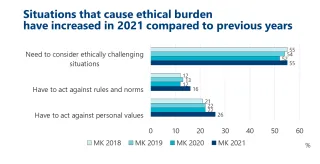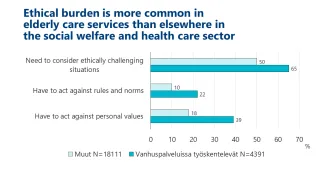Policy recommendation: Ethical burden of work in elderly care services can be reduced by investing in well-being at work

7 recommendations based on research and expertise
Research data behind the recommendations
Causes and consequences of ethical burden
There are many situations1 in social welfare and health care that may cause ethical burden. Ethical burden occurs when an employee is forced to act against the right way of working due to external constraints or when the employee is uncertain of the right way of working. Ethical burden refers to experiences of stress and strain due to moral conflicts.
Situations that cause ethical burden include organizational constraints in the workplace, challenges related to personal and power relationships, challenges related to patient care and feelings of incompetence and insecurity among employees3.
Organizational reasons are related to, for example, management, organization of shifts and insufficient resources3. Challenges related to personal and power relations are related to, for example, the hierarchy of the organization and conflicts between colleagues. Issues related to patient care include, among others, inadequate or unnecessary treatment and the suffering experienced by patients. Challenges of employees' experiences of incompetence and insecurity are related to the professional’s own assessment of their competence and safety in care work.
Ethical burden has increased
Because employees face people in social situations, ethically challenging situations arise1. These situations are also burdensome if there is insufficient competence or no common rules in the work community. It also appears that, in 2021, these situations were more common. The results are based on the Finnish Institute of Occupational Health's Mitä kuuluu? well-being at work survey for social welfare and health care professionals in 2018–2021.

Ethically burdensome situations occur up to twice as much in elderly services as elsewhere in the social welfare and health care sector1. These situations involve a burden that can be reduced with correct measures.

Link with work ability
Ethical burden alone and in combination with other psychosocial stress factors is linked to impaired work ability, which, as an indicator, predicts the length of working careers4,5.
In a previous study5, it was found that work-related stress is an important cause of incapacity for work, as measured with both Karasek and Siegrist models, as is unfair decision-making. According to the Karasek model, work-related stress arises in situations where there is an imbalance between high work demands and low control over work. In the Siegrist model, however, work-related stress occurs when a great deal of effort is invested in the work, but little value is obtained. Unfair decision-making means, for example, that the reasons behind decisions are not known.
Our study4 shows that ethical burden is almost as an important stress factors as work-related stress and the experience of unfairness when it comes to impaired work ability. The risk of impaired work ability is higher if the number of stress factors present increases. When all four stress factors are present at the same time, the risk of impaired work ability is nearly seven times higher than the risk when none of the stress factors are present.
The consequences of ethical burden for the employees of elderly care services were absences, mental health problems, unhealthy and antisocial lifestyles and physical symptoms, as well as impaired work ability3,4.
Authors

Jaana Laitinen

Tiina Koivisto

Risto Nikunlaakso

Kirsikka Selander

Eveliina Korkiakangas

